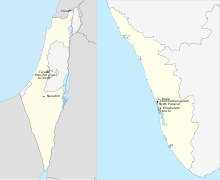Judeo-Malayalam
| Judeo-Malayalam | |
|---|---|
| യെഹൂദ്യമലയാളം (yehūdyamalayāḷaṃ) പഴയ ഭാഷ (paḻaya bhāṣa) מלאיאלאם יהודית (malayalam yəhûḏîṯ) | |
| Native to | Kerala, Israel |
| Ethnicity | Cochin Jews |
Native speakers | a few dozen (2009)[1] |
| Malayalam alphabet Hebrew alphabet | |
| Language codes | |
| ISO 639-3 | – |
| Glottolog | None |
 Judeo-Malayalam speaking communities in Kerala (largely historical) and Israel (current) | |
Template:Jews and Judaism sidebar Judeo-Malayalam (Malayalam: യെഹൂദ്യമലയാളം, yehūdyamalayāḷaṃ; Hebrew: מלאיאלאם יהודית, malayalam yəhūḏīṯ) is the traditional language of the Cochin Jews (also called Malabar Jews), from Kerala, in southern India, spoken today by a few dozens of people in Israel and by probably fewer than 25 in India.
Judeo-Malayalam is the only known Dravidian Jewish language. (The only other Dravidian language spoken regularly by a Jewish community is Telugu, spoken by the small, and only very newly observant Jewish community of east-central Andhra Pradesh. See related article: Telugu Jews.)
Since it does not differ substantially in grammar or syntax from other colloquial Malayalam dialects, it is not considered by many linguists to be a language in its own right, but a dialect, or simply a language variation. Judeo-Malayalam shares with other Jewish languages like Ladino, Judeo-Arabic and Yiddish, common traits and features. For example, verbatim translations from Hebrew to Malayalam, archaic features of Old Malayalam, Hebrew components agglutinated to Dravidian verb and noun formations and special idiomatic usages based on its Hebrew loanwords. Due to the lack of long-term scholarship on this language variation, there is no separate designation for the language (if it can be so considered), for it to have its own language code (see also SIL and ISO 639).
Unlike many Jewish languages, Judeo-Malayalam is not written using the Hebrew alphabet. It does, however, like most Jewish languages, contain many Hebrew loanwords, which are regularly transliterated, as much as possible, using the Malayalam script. Like many other Jewish languages, Judeo-Malayalam also contains a number of lexical, phonological and syntactic archaisms, in this case, from the days before Malayalam became fully distinguished from Tamil.
In spite of claims by some Paradesi Jews that their ancestors' Ladino influenced the development of Judeo-Malayalam, so far no such influence, not even on the superficial lexical level, is found. There is, however, affiliation with Mappila Malayalam, especially of North Malabar, in words such as khabar or khabura (grave), and formations such as mayyatt āyi (മയ്യത്ത് ആയി) used by Muslims and śalōṃ āyi (ശലോം ആയി) used by Jews for died (മരിച്ചു പോയി, mariccu pōyi in standard Malayalam). As with the parent language, Judeo-Malayalam also contains loanwords from Sanskrit and Pali as a result of the long-term affiliation of Malayalam, like all the other Dravidian languages, with Pali and Sanskrit through sacred and secular Buddhist and Hindu texts.
Because the vast majority of scholarship regarding the Cochin Jews has concentrated on the ethnographic accounts in English provided by Paradesi Jews (sometimes also called White Jews), who immigrated to Kerala from Europe in the sixteenth century and later, the study of the status and role of Judeo-Malayalam has suffered neglect. Since their emigration to Israel, Cochin Jewish immigrants have participated in documenting and studying the last speakers of Judeo-Malayalam, mostly in Israel. In 2009, a documentation project was launched under the auspices of the Ben-Zvi Institute in Jerusalem. Digital copies can be obtained for any scholar who wishes to study Judeo-Malayalam.
See also[edit]
References[edit]
- "Judeo-Malayalam page", Jewish Language Research
- "Malayalam" page, Ethnologue
- Hebrew (omniglot.com)
- "Jews of India", The South Asian
- ↑ Gamliel, Ophira (2009). Jewish Malayalam – Womens's Songs (PDF) (Thesis). Hebrew University. Archived from the original (PDF) on 26 March 2017. Retrieved 19 May 2015.
External links[edit]
- Languages without Glottolog code
- Dialects of languages with ISO 639-3 code
- Articles containing Malayalam-language text
- Articles containing Hebrew-language text
- Cochin Jews
- Dravidian languages
- Jewish languages
- Jews and Judaism in India
- Languages of India
- Malayalam dialects
- Languages of Kerala
- Judaism in Kerala
- Endangered languages of India